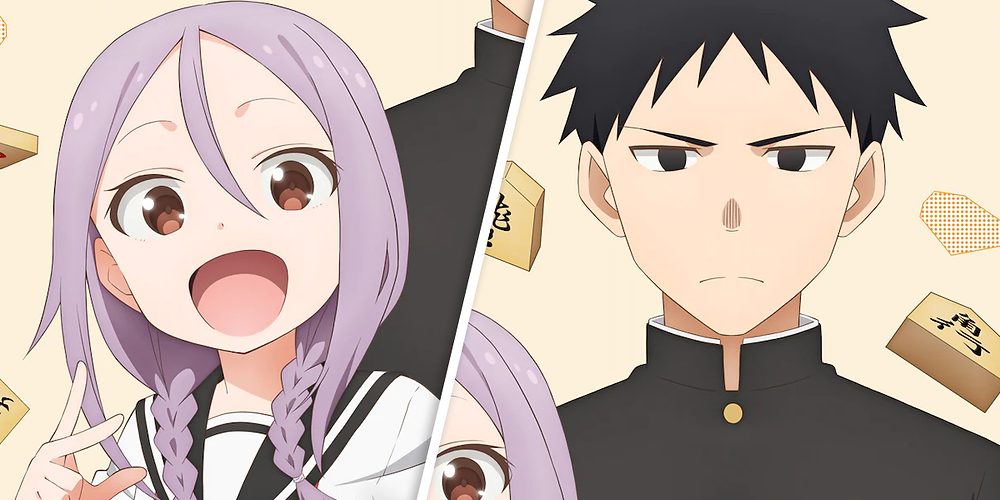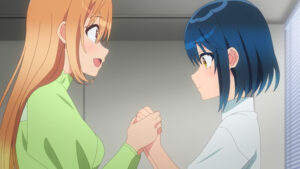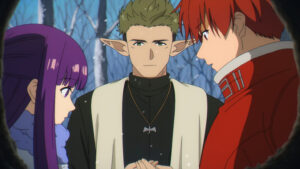



Soredemo Ayumu wa Yosetekuru – 03
























From my perspective at least, Soredemo Ayumu wa Yosetekuru ages better than you think it might. To an extent we have the same scenario as Karaki Jouzu no Takagi-san, in that things change a lot more than you expect (or even realize at times). Not only that, we have what’s clearly a very competent adaptation helmed by an experienced director who seems to be following what worked with Karakai Jouzu – tweaking things just enough to give the anime more narrative flow than the manga. In any event, it’s working. I don’t find this series as winning as Takagi-san but Yamamoto-sensei does know how to work this machinery…
Given that these are high schoolers, I guess it makes sense for Ayumu and Urushi to already be on a date by the third episode (which is faster than it happened in the manga, for the record). From Ayumu’s perspective everything is kosher as long as he doesn’t “confess” – that was his promise as a man, and it didn’t say anything about dating. And he’s off to a good start even before the date, recognizing that Urushi has changed her hair (that’s 1% level metrics for a schoolboy). He could use some work on hiding his jealousy though – when Takeru comes by to introduce himself, Ayumu pretty much goes to (shogi) pieces.
Having already dispensed with the aiaigasa we waste no time in getting down to the culture festival, another core staple in the romcom pantry. And Ayumu just flat out asks Urushi to walk around with him as a date – adding only that she can call it “recruiting” if it makes her feel better. Sakurako is certainly in their corner, though she continues to torture Takeru regarding their own couple status. It’s only slightly less obvious with those two, but they’re still going through the motions of denial. Unless you count Urushi’s world’s wimpiest tsundere act, the A couple aren’t even putting up much of a front.
We close with a couple of classics, the haunted house and the first name. Takeru does indeed overscare Urushi, but he was still more scared than she was. As for Ayumu he gets even more jealous at Urushi calling Takeru by his first name, and her “I’m only following your lead” excuse doesn’t cut it. Unfortunately Ayumu’s poker face slips badly when Urushi does manages to choke out his name, so that one is on hold for the moment (and I noticed he didn’t return the favor). Coming from a culture that completely lacks this first name mystique I’ve always found it hard to grok just how would up Japanese (especially teens) get about this, but it seems to be a very real thing.
Bucchigire! – 01
























I’m squarely on the fence with Bucchigire!. It’s interesting visually and thematically right up my alley as a Shinsengumi-based historical fiction. I just wish the characters and writing generally were doing more to capture my interest. There’s nothing bad about this series but everything has a bit of a two-dimensional quality to it. 2-D characters going through the motions of a 2-D plot. In my mind I’m seeing a scenario where somebody good at brainstorming concepts hands them off to someone good at the details to do the actual writing, except here the first guy is doing everything.
Katsura Kogorou, better known to the world as Kido Takayoshi, is the historical MacGuffin of the week this time. He was, like Shouzan Sakuma, one of the most important figures in the Meiji Restoration. He’s rumored to be visiting Kyoto from his base in Choushu Domain (today part of Yamagata) and the faux-sengumi go undercover to see what he’s up to. That means Akira as a geisha, which is kind of an interesting turn. “Katsura” does show up at the teahouse but he turns out to be a fake, there to root out pro-shogunate spies and massacre them. The real Katsura is there, however – deep undercover as the geisha acting as the main hostess (which seems like a bit of a stretch, if we’re honest).
With Meiji drama there’s always the interesting question of whether it will take sides. This most recent Japanese civil war isn’t like the one in the U.S., happening at about the same time, where one side was clearly on the wrong side of history. Most of these dramas more or less abdicate the issue by focusing on the personal stories on both sides, and to an extent that seems to be true with Bucchigire!. But just as Rurouni Kenshin was a story of protagonists on the Imperial (winning) side which ultimately sided with them, this is one with protagonists on the Tokugawa (losing) side that clearly slants in their direction. Which is perfectly fine, of course.
The similarity with Rurouni Kenshin ends there, unfortunately. But hey, we do need something to tide us over as the endless wait for news on that series drags on. I imagine I’ll make a decision on Buchigire! after the next episode, but I think it’s going to need to show me a little more than it already has.
![]()
![]()
![]()
![]()
![]()
![]()




